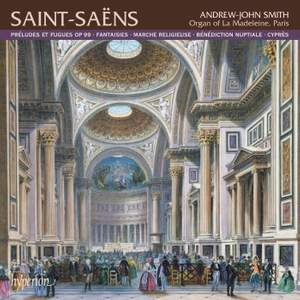Despite his modern fame, much of Saint-Saëns’s music was under-appreciated in his lifetime, and many of his organ works remain little known. His adherence to Classical principles - enshrined in the works of his idols Bach, Mozart, Schubert and Mendelssohn - and his antipathy towards what he perceived as the louche modernism of the Romantic movement hardly endeared him to congregations or clergy, long gorged on the fripperies offered by contemporary organists and somewhat resistant to being ‘told what was good for them’.
But as a performer his prodigious talent could not be ignored and by 1858, aged just twenty-three, he found himself at the console of Aristide Cavaillé-Coll’s brand-new organ at La Madeleine in Paris - four manuals, 48 stops and an unprecendented symphonic wall of sound lay at his disposal. (He also found the instrument, occupying the entire West wall of this enormous edifice, spacious enough to accommodate a constant stream of stars from the international musical firmament, including Liszt, Sarasate, Clara Schumann and Anton Rubinstein.) He was to hold the post for some twenty years.
The earliest works in Andrew-John Smith’s programme were composed during Saint-Saëns’s tenure at La Madeleine and it is a rare delight to be able to hear them performed on the organ the composer knew and so loved (and using only the registrations available to him at the time). For later compositions Smith employs some of the subsequent additions to Cavaillé-Coll’s original conception; the effects are thrilling and reflect contemporary reports of Saint-Saëns’s own performance practice - much of it unusual then and now - as his travels took him around France playing Cavaillé-Coll’s ever-more gargantuan organistic creations.
The English organist and conductor Andrew-John Smith was educated as an organ scholar at New College, Oxford and the Sweelinck Conservatorium, Amsterdam. Described by Choir & Organ magazine as ‘a rare pleasure in Britain’ he performs regularly in Europe and has recorded and broadcast as soloist and accompanist both for the BBC and abroad.
A Fellow of the Royal College of Organists, he has been a finalist for the Grand Prix de Chartres, and a prize-winner at the Royal College of Organists’ ‘Performer of the Year’ and the St Albans’ International Organ Festival. This is his first recording for Hyperion.





